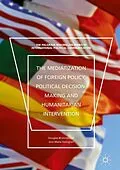This book examines under what scope conditions foreign policy actors are more or less likely to adopt media logic. The authors analyze this media logic under three specific scope conditions: uncertainty, identity, resonance. First, they lay out the general adaptation of media logic in the general debate of the UN General Assembly 1992-2010. They then explore the adaptation of media logic under six different foreign policy decision-making processes in Finland, Sweden and the United Kingdom concerning the cases of humanitarian intervention in Côte d'Ivoire and Libya, both in 2011. The results of this study indicate the need to move beyond the assumption of a general process of mediatization affecting politics in total, across contextual factors. Instead, they point in the direction of a nuanced process of mediatization more likely under certain scope conditions and in certain political contexts.
Autorentext
Douglas Brommesson is Associate Professor in Political Science at Lund University, Sweden. His main research interests include foreign policy analysis, international relations and religion and politics. Most recently, he co-edited the volume Global Community? Transnational and Transdisciplinary Exchanges (2015). His articles have appeared in journals such as Cooperation and Conflict, International Politics, the Journal of International Relations and Development, and the International Review of Sociology.
Zusammenfassung
This book examines under what scope conditions foreign policy actors adopt media logic. The authors analyze media logic under three specific scope conditions: uncertainty, identity, resonance. First, they lay out the general adaptation of media logic in the general debate of the UN General Assembly 1992-2010. They then explore the adaptation of media logic in Finland, Sweden and the United Kingdom concerning the cases of humanitarian intervention in Côte d'Ivoire and Libya, both in 2011. The results indicate the need to move beyond the assumption of a general process of mediatization affecting politics in total. Instead, they point in the direction of a nuanced process of mediatization more likely under certain scope conditions and in certain political contexts.
Inhalt
1. Mediatization of foreign policy decision-making .- 2. The scope conditions of mediatized foreign policy .- 3. Design and methodological concerns .- 4. Mediatization in the United Nations General Assembly .- 5. Political logic at play in Côte d'Ivoire .- 6. Mixed logics at play in Libya .- 7. Conclusion: towards a theory on the variation of mediatization of foreign policy.
